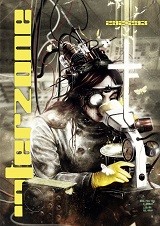“Climbing Stories” by Aliya Whiteley
“Wet Dreams” by Rich Larson
“The Pain Barrier” by Alexander Glass
“The Faerie Engine” by Alexander Glass
“The Soul Doctors” by Alexander Glass
“Thank You, Clicking Person” by Jeff Noon
“Subira’s Lattice” by Val Nolan
“Walking in From the West” by Charles Wilkinson
“Wind, River, Angel Song” by Cécile Cristofari
“The Thing about Ants and Astronauts” by Justen Russell
“Bridget Has Disappeared” by Tamika Thompson
“Rusting” by Lucy Zhang
Reviewed by Chuck Rothman
Long time Interzone editor Andy Cox is moving on to other things, and the June issue of the magazine (his 100th edited issue!) goes out with some excellent stories.
The issue starts with a short vignette by Aliya Whiteley, “Climbing Stories,” about a perfume that uses the idea of an alien goddess in its advertising. The writer tries it out to see how it actually works. It’s a mood piece that has a subtle message about being able to react to advertising appropriately.
“Wet Dreams” by Rich Larson is a slice of life about a man and a cat that shows some very strange symptoms. The protagonist reports the mundane events of his life up to and including what happens to the cat. I find him too unemotional and he doesn’t seem to be affected by anything. I got no sense of character or any strong emotions.
“The Pain Barrier” is the first of three consecutive stories by Alexander Glass. It tells of Walker, who wants to break into a strange prison where his lover Ariette has been condemned to because she owed money when she died. She lives in New Penitence, her past forgotten, and Walker works to free her. The setting is fascinating but the ending is a bit too confusing.
“The Faerie Engine” features Mistress Elspeth, an older woman who gets a visit from a borderlander—one of the faerie—who has an enigmatic request to have her come with him to repair a magical device that he gives little information about. The story is strong on their interaction, but doesn’t really amount to much other than mood.
“The Soul Doctors” is the third of Glass’s stories, a novelette featuring Billy and Wagner, two men from a parallel world who come across someone who had been gravely wounded and has had his soul taken away. The two go looking for the culprit, ending up at a casino which seems to have some of the answers. The background is complex and I have to admit I had a hard time following what was going on, even after multiple readings.
“Thank You, Clicking Person” by Jeff Noon is told from the point of view of a capcha—one of those arrays on web pages with the instructions “Click all pictures that show . . .” It is based on the idea that the computer is learning from the choices people make. I like this mostly because of its subtlety and watching as things slowly change.
Val Nolan contributes “Subira’s Lattice,” where the title character is a maid on a world filled with strange crystal figures. When disaster strikes, Subira and her boss, the Marchionesses have to flee and she learns the Marchioness’s secret and the secret of their world. Good characters and an intriguing situation that resolves in a strong ending.
“Walking in From the West” starts with Wendrill disposing of Felix’s body. It hints at first that Felix was his lover, but we discover he was essentially a robot butler, and such devices are considered as people. Wendrill’s neighbor, Rigley, starts nosing around. Charles Wilkinson makes Wendrill likable despite the fact he’s something of a jerk.
“Wind, River, Angel Song” by Cécile Cristofari documents a disease that is going around, brought by the wind, and which eventually turns people into trees. The protagonist has a baby—children are immune—and is thunderstruck to discover she has the disease herself and has to deal with the ramifications. A story heavy on emotions as the woman learns to understand her fate.
It’s on to hard SF with Justen Russell‘s “The Thing about Ants and Astronauts” where an astronaut goes into the unexplored Blackheart Nebula, where two pilot have gone before him and never returned. It’s juxtaposed with the story of how ants had infested his boyhood home in Kanpur, India. Both stories are good reading, but just when you begin to wonder about the connection, it’s made abundantly clear. Excellent story overall.
The title of “Bridget Has Disappeared” by Tamika Thompson describes the story, but only in the broadest sense. Bridget is married to Yusef, the narrator’s wife, and has a tendency to disappear and then show up again, insisting that she hasn’t gone anywhere. The mystery eats at their relationship until it is resolved. The ending is strong and when we hear what is really going on, is fitting and scary.
Lucy Zhang finishes the issue with “Rusting.” Set in a future where metal trash is encroaching on the cities, a woman contracts “rust,” a deadly disease where a robot “doll” is sent to gather her up as she becomes considered trash. A mood piece showing her becoming resigned to her fate.
The issue is generally pretty heavy on emotional issues, and there are several excellent stories in it. The writing on everything is poetic and strong, and it is worth taking a look if you like your stories with an emphasis on literary values.
Chuck Rothman’s novels Staroamer’s Fate and Syron’s Fate are available from Fantastic Books. His story, “Her Old Man” is in the anthology Horror for the Throne.
 Interzone 292/293, July 2022
Interzone 292/293, July 2022